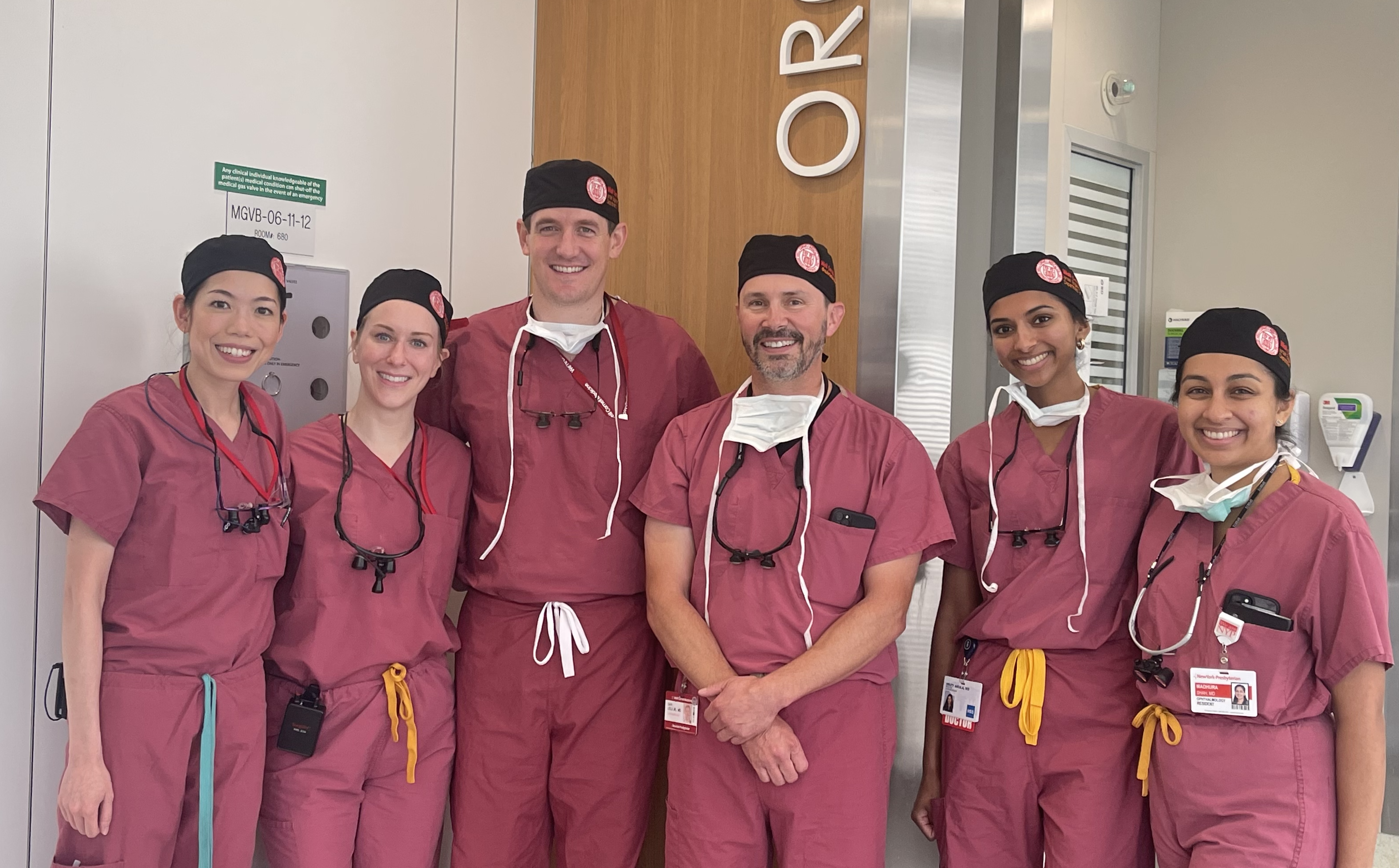Post Graduate Year 1 (PGY-1)
Our multi-specialty, fully integrated internship was thoughtfully designed to complement the subsequent three years of ophthalmology residency. This formative year has distinct educational advantages relative to traditional preliminary internships. Each incoming resident begins their PGY-1 year in the Department of Ophthalmology at Weill Cornell to orient them to the Department, New York Presbyterian Hospital, Weill Cornell Medicine, and New York. During the year, three months are spent in ophthalmology learning the fundamentals and principles of the ophthalmic exam, patient workup, refraction, ophthalmic imaging, and basic ophthalmic surgical techniques. The remaining nine months include judiciously selected rotations with allied specialties. These include rotations in Emergency Medicine, Otolaryngology/Head and Neck Surgery, Plastic Surgery, Neurology, Neuroradiology, Dermatology, and Internal Medicine, including Endocrinology, Infectious Disease, and Rheumatology. Each of these electives provide the future ophthalmologist with world-class exposure to the evaluation and management of systemic diseases with common ophthalmologic manifestations, and advances collegiality between the physicians with whom each resident will work throughout their training and careers. Throughout the year, there will be opportunities for mentorship, research, and longitudinal exposure within ophthalmology.
PGY1 residents rotate on the following services:
- Ophthalmology
- Emergency Medicine
- Otorhinolaryngology/Head and Neck Surgery
- Plastic Surgery
- Neurology
- Neuro-Radiology
- Internal Medicine
- Endocrinology
- Rheumatology
- Infectious Disease
- Pathology
- Dermatology
Post Graduate Year 2 (PGY-2)
The second year of residency represents a concentrated introduction to the basic principles and theories of general ophthalmology and ophthalmic surgery. PGY-2 residents master the basic techniques of ophthalmic examination and imaging, as well as the diagnosis and management of a variety of ocular diseases. A total of six months is spent in comprehensive ophthalmology rotations. To complement this comprehensive foundation, purposefully selected subspecialty rotations prepare the PGY-2 resident to manage ophthalmic and ocular adnexal pathology seen on-call and provide them with early, diverse exposures to inform career decisions. Prioritizing resident surgical development, PGY-2 residents are consistently assigned to operating rooms throughout the year to gain primary surgical experience in cataract, strabismus, and oculoplastic surgery.
PGY2 residents primarily rotate on the following services:
- Cornea and Comprehensive Ophthalmology
- Pediatric Ophthalmology
- Oculofacial Plastic, Reconstructive, and Orbital Surgery
- Neuro-Ophthalmology
- Ocular Oncology
Post Graduate Year 3 (PGY-3)
The third year of residency at Weill Cornell Medicine is one of subspecialty immersion. Residents have dedication rotations in glaucoma, medical retina and vitreoretinal surgery, uveitis, pediatric ophthalmology and strabismus, and oculofacial plastic surgery. During this year, residents obtain significant experience in the diagnosis and management of increasingly complex disease. During the PGY-3 year, surgical and procedural experiences include cataract surgery, strabismus surgery, oculofacial plastic surgery, vitreoretinal surgery and lasers, and glaucoma surgery and lasers. PGY-3 residents also develop skills and expertise on our busy inpatient consultation service at New York-Presbyterian Hospital. During this rotation, increasing autonomy and indirect supervision is granted with residents serving as specialty consultants, working with and teaching those from other disciplines while managing care for patients with routine and complex ophthalmic disorders.
PGY-3 residents primarily rotate on the following services:
- Glaucoma
- Medical Retina, Uveitis, and Vitreoretinal Surgery
- Pediatric Ophthalmology
- Oculofacial Plastic, Reconstructive, and Orbital Surgery
- Inpatient Consults
Post Graduate Year 4 (PGY-4)
In their final year of residency training, residents develop mastery of their medical and surgical skills while taking on more leadership, education, and administrative roles. The PGY-4 year is a surgically heavy year, and residents typically spend multiple days in the OR each week. During this year, residents are assigned to longer, mini-fellowship style rotations to work closely with select faculty who are judiciously selected for their exceptional surgical teaching and mentorship. Clinics and ORs are closely coupled, allowing residents to gain continuity in preoperative, intraoperative, and postoperative surgical care. PGY4 residents also spend a dedicated rotation at NewYork-Presbyterian Queens and function with increasing responsibility in caring for a high volume of patients with advanced pathology.
Ophthalmology Call
Call scheduling during all three years of ophthalmology residency is 100-percent call-from-home, without overnight in-house call or night float rotations. We maintain compliance with all state, hospital, and ACGME-mandated duty hours.


